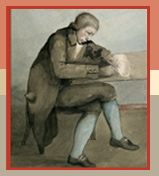
Other works
Siencin Morgan to I.M. 30 Nov 1771
I.M. to Revd Evan Evans, 1 April 1779
Owen Jones to I.M., 11 July 1779
Daniel Walters to I.M., 27 June 1782
Owain Myfyr to I.M., 30 September 1782
Daniel Walters to I.M., 1 October 1782
Edward Eagleton to I.M., 3 Aug 1782
John Walters jr. to I.M., 4 March 1783
I.M. to Owen Jones, 20 September 1783
I.M. to William Meyler, 1 January 1792
Margaret Williams to I.M., 1 January 1793
I.M. to Edward Jones, 1 January 1794
I.M. to Revd Hugh Jones, 4 June 1794
I.M. to Margaret Williams, 27 August 1794
I.M. to Margaret Williams, 19 Feb 1794
I.M. to William Matthews, 18 July 1796
I.M. to the Board of Agriculture, 28 July 1796
William Matthews to I.M., 6 October 1796
I.M. to Sir Richard Colt Hoare, 17 August 1797
I.M. to William Owen Pughe, 20 December 1798
William Owen Pughe to I.M., 28 Aug 1800
I.M. to David Williams, 1 January 1803
I.M. to Owen Jones, 5 April 1806
I.M. to Taliesin Williams, 16–17 Aug 1813
I.M. to Benjamin Hall, 14 March 1816
I.M. to Magistrates at Cowbridge, 13 March 1818
William Jenkins Rees to I.M., 28 January 1822
Walter Davies to Iolo Morganwg, 16 May 1793
(NLW 21280E, Letter 72)
Walter Davies (Gwallter Mechain) to Iolo Morganwg
16 May 1793
Postmark: none
Source: NLW 21280E, no. 72
All Souls, May 16. '93. D. 4. 6. A. M
Dear Sir,
An opportunity of getting franks for a few acquaintances in London offering itself, therefore, I frankly embrace it. I expect you in Oxford about this time. When shall I have the pleasure of your company here? Do you wait for the company of our Chancellor (the Duke of Portland)? who is expected here the 2nd of July.
I want to mention to you about a publication of the Tuscan antiquities, which I happened lately to see. Its supposed author I never heard of among Roman, that is, Latin historians, although he says that his grandfather died under the cruelties of Lucius Scylla. He then must live about the Augustan Age. He calls himself Prosperus Fosulanus. He has Tuscan inscriptions, which he imagines to be ancient indeed. He says that he wished to render them into Latin letters, but could not. He is very wrong in some points, and therefore I conclude that the whole is a piece of deception invented by the editor (in the last century) called Inglinamus, a German if I remember well. If it is genuine it is worth notice. But how can it be? He would have been quoted by some author or other, which I have not met with, in my confined sphere of reading. Have you? who have read ten times as much as I did? Let me know if you have, and your opinion thereupon.
I had but just half an hour's time to examine. When I go to that library next I will give it another half. In Anglesea, they suppose Coelbren y Beirdd to be wholly invented by you. They expected to have seen it some time before it came there, but that time (say they) was employed in the invention. Men in general are hard of conviction, error and ignorance will not admit of innovation. Darkness flies the light. What is this new innovating doctrine said the pagans of old for Xtianity. Protestants are Heretics at the bar of the Catholicks, and all Dissenters schismatics in the opinion of the established religion of every land. The addition of 11 days to the Julian style is not yet well received by those who pre-existed the year 1752. But really I am not hard of belief, nor yet over credulous. Then you may think I have the vanity to suppose myself something capable of distinguishing plausibilities from inconsistencies. No do not think me conceited, or else you will do me injustice. Coelbren y Beirdd, if genuine, gives you applause and credit for the preservation, and if spurious, (as generally imagined) it is not derogatory to your genius, for upon my word (which is a great thing) whoever invented it, he was no fool.
The stream that carries me away most is its peculiarity of construction to express the sounds of our language. I can't but admire it for that. And I think it too compleat to be of an ancient date. No ancient alphabets have such exquisite symmetry in their formation. Therefore, take the glory of the invention to yourself. But yet I stand in equilibrio, there is something to be said both pro. and con. Put your finger to the ballance, and turn the scale in your next letter, which you may have the convenience of sending in Mr O. Jones', with the bearer hereof, who returns to Oxford the latter end of this month. I have no more time. Excuse haste, as all bad writers say. I will collect some queries now and then, but this Cacöethes Scribendi have upon me unawares, when I had no materials by me, hardly ink and paper.
I am, sir, your most obedient servant,
Walter Davies
N. B. You are curious in decyphering inscriptions. There is for you one on the seal. Qu: What is the V. D. M. that Jeffreys in his proposal sticks to the tail of his name, his ca[u]danymic I should have said?
Endorsement:
Walter Davies

